
Định nghĩa và phân loại tính từ
1. Định nghĩa tính từ
– Tính từ là từ chỉ tính chất, mức độ, phạm vi, ... của một người hoặc vật. Nó bổ nghĩa cho danh
từ, đại từ hoặc động từ liên kết (linking verb). Tính từ luôn đứng trước danh từ được bổ nghĩa:
That is my new red car.
Trừ trường hợp "galore" (nhiều, phong phú, dồi dào) và "general" trong tên các cơ quan, các chức
vụ lớn là hai tính từ đứng sau danh từ được bổ nghĩa:
There were errors galore in your final test;
UN Secretary General (Tổng thư ký Liên hợp quốc).
– Tính từ không thay đổi theo ngôi và số của danh từ mà nó bổ nghĩa, trừ trường hợp của "these"
và "those".
– Tính từ có thể kết hợp với “the” để tạo thành danh từ
Ví dụ: The poor : người nghèo
The rich: người giầu
2. Phân loại tính từ
– Tính từ miêu tả (descriptive adj): Tính từ mô tả là các tính từ chỉ màu sắc, kích cỡ, chất lượng
của một vật hay người.
Ví dụ: beautiful, interesting, colorful, red, new, important….
– Tính từ giới hạn (limiting adj): Tính từ giới hạn là tính từ chỉ số lượng, khoảng cách, tính chất sở
hữu, ...
Ví dụ:
số đếm: one, two….
số thứ tự: first, second….
tính chất sử hữu: his, your, my….
đại từ chỉ định: this. that, these….
số lượng: much, few, many…..
3. Tính từ tận cùng bằng –ing và –ed
Chúng thuộc loại tính từ miêu tả, nhưng chúng ta sẽ làm rõ sự khác biệt giữa hai loại này trong
phần này.Có nhiều cặp tính từ tận cùng bằng –ing và –ed, ví dụ: boring and bored, interesting and
interested…
•Tính từ kết thúc bằng đuôi –ing cho bạn biết về tính chất của một cái gì đó
My job is boring
The film was disappointing. I expected it to be better.
1

•Tính từ tận cùng bằng đuôi –ed cho bạn biết một người nào đó cảm thấy như thế nào về
một cái gì đó.
I’m not satisfied with my job.
Julia is interested in politics.
I’m bored.
Ai đó “interested” (quan tâm) bởi vì có điều gì (hay ai) “interesting” (hấp dẫn, lí thú)
Are you interested in buying a car?
Tom find politics interesting (Tom thấy chính trị rất lí thú hấp dẫn)
Did you meet anyone interesting at the party?
Ai đó “surprised” (ngạc nhiên) bởi vì điều gì đó “surprising” (gây ngạc nhiên)
Everyone was surprised that he passed the examination.
It was quite surprising that he passed the examination.
Ai đó “disappointed” (thất vọng) bởi vì điều gì đó “disappointing” (làm thất vọng)
I was disappointed with the film.
The film was disappointing.
•Những cặp tính từ khác tận cùng bằng –ing và –ed là:
Fascinating – fascinated
Exciting – excited
Amusing – amused
Amazing – amazed
Embarrassing – embarrassed
Terrifying – terrified
Worrying – worried
Exhausting – exhausted
Astonishing – astonished
Shocking – shocked
Disgusting – disgusted
Confusing – confused
Frightening – frightened
Bài tập 1: Chọn đáp án đúng
1. We were all (horrifying/horrified) when we heard about the disaster.
2. It’s sometimes (embarrassing/embarrassed) when you have to ask people for money.
3. Are you (interesting/interested) in football?
4. I enjoyed the football match. It was quite (exciting/excited).
2

5. It was a really (terrifying/terrified) experience. Afterwards everybody was very
(shocking/shocked).
6. I had never expected to be offered the job. I was really (amazing/amazed) when I was offered it.
7. The kitchen hadn’t been cleaned for ages. It was really (disgusting/ disgusted).
8. Do you easily get (embarrassing/embarrassed)?
Bài tập 2: Hoàn thành các câu sau bằng tính từ đuôi ing hoặc ed. Chữ đầu tiên của tính từ đã
được cho sẵn.
1. I seldom visit art galleries. I’m not very in…………………in art.
2. We went for a very long walk. It was very ti…………
3. Why do you always look so b………….? Is your life really so b……?
4. He is one of the most b…………people I’ve ever met. He never stops talking and never says
anything in…………
5. I’m starting a new job next week. I’m quite ex………………about it.
KEY
Bài 1:
1. horrified
2. embarrassing
3. interested
4. exciting
5. terrifying
6. amazed
7. disgusting
8. get embarrassed
Bài 2:
interested
2. tiring
3. bored, boring
4. boring, interesting
5. excited
Vị trí và chức năng của tính từ
Tính từ có thể làm tính từ (attributive use) hoặc bổ ngữ (predicate use).
1. Làm tính từ:
3

– Khi làm tính từ, tính từ tiếng Anh thường đứng trước danh từ.
Ví dụ: It is a hot day.
This is a new car.
Nam will become a good worker.
– Những trường hợp đặc biệt:
+ Đứng sau một nhóm từ ngụ ý đo lường
A river two hundred kilometers long
A man eighty years old
A road four metres wide
+ Đứng sau everything, anything, something, nothing
I’ll tell you something new
There is nothing new.
He’ll provide everything necessary.
+ Đứng sau danh từ khi cần một nhóm từ bổ nghĩa cho nó
He wants a glass full of milk.
He is a man greedy of money
+ Trong trường hợp nhiều tính từ cùng bổ nghĩa cho một danh từ, có thể đặt sau
He has a face thin and worn, but eager and resolute.
2. Làm bổ ngữ
– Tính từ làm bổ ngữ khi nó kết hợp với một động từ làm thành vị ngữ trong câu. Các động từ trước
nó thường là “to be, to turn, to become, to fall, to keep, to remain…”
Ví dụ: It is cold, wet and windy.
Nam fell asleep.
– Nó cũng có thể đi theo sau cả động từ và tân ngữ để làm bổ ngữ cho tân ngữ.
Ví dụ: The sun keeps us warm.
This doesn’t make me happy.
Chú ý: Hấu hết các tính từ có thể dùng được ở cả hai chức năng trên. Chỉ có một số động từ chỉ
dùng làm bổ ngữ sau: alive, afraid, ashamed, aware, asleep, awake, alone.
Bài tập: Đặt tính từ trong ngoặc vào đúng vị trí
1. Bring me something to drink (cool)
2. The leaves turn in Autumn (yellow)
3. Woollen clothes keep our bodies (warm)
4. Shelly is a poet (famous)
5. I have nothing to give you (interesting)
6. The corn waved in the wind (ripe, golden)
4

7. Vietnam is a country (rich and beautiful)
8. I found him still in his bed (asleep)
9. Aren’t these oranges (delicious)?
10. Is she a girl (pretty)?
Quy tắc cấu tạo tính từ
1. Tính từ đơn
• Noun + y
Ví dụ: rain + y –> rainy
wind + y –> windy
sun + y –> sunny
• Noun + ly
Ví dụ: day + ly –> daily
man + ly –> manly
• Noun + ful
Ví dụ: care + ful –> careful
beauty + ful –> beautiful
• Noun + less
Ví dụ: care + less –> careless
home + less –> homeless
• Noun + en
Ví dụ: gold + en –> golden
wool + en –> woolen
• Noun + some
Ví dụ: trouble + some –> troublesome
quarrel + some –> quarrelsome
• Noun/adjective + ish
Ví dụ: book + ish –> bookish
white + ish –> whitish
girl + ish –> girlish
• Noun + ous
Ví dụ: humour –> humourous
danger –> dangerous
2. Tính từ ghép
5




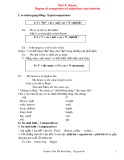
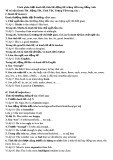
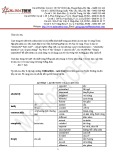
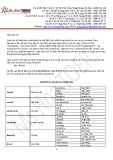



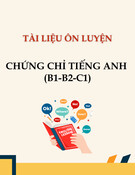

![Tài liệu luyện thi TOEIC cấp tốc trong 10 ngày [chuẩn nhất]](https://cdn.tailieu.vn/images/document/thumbnail/2025/20251029/kimphuong1001/135x160/99661761725822.jpg)
![Tài liệu Phá đảo TOEIC 900+ từ mất gốc trong 30 ngày [Mới nhất]](https://cdn.tailieu.vn/images/document/thumbnail/2025/20251029/kimphuong1001/135x160/2101761720956.jpg)











